

African migration 'a trickle' thanks to trafficking ban across the Sahara. Tube Creature. 'We're moving to higher ground': America's era of climate mass migration is here. After her house flooded for the third year in a row, Elizabeth Boineau was ready to flee.
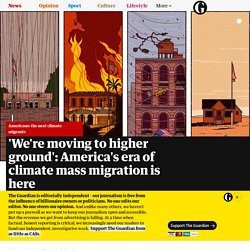
She packed her possessions into dozens of boxes, tried not to think of the mold and mildew-covered furniture and retreated to a second-floor condo that should be beyond the reach of pounding rains and swelling seas. Boineau is leaving behind a handsome, early 20th-century house in Charleston, South Carolina, the shutters painted in the city’s eponymous shade of deep green. Last year, after Hurricane Irma introduced 8in of water into a home Boineau was still patching up from the last flood, local authorities agreed this historic slice of Charleston could be torn down.
“I was sloshing through the water with my puppy dog, debris was everywhere,” she said. “I feel completely sunken. Life expectancy progress in UK 'stops for first time' Image copyright Yuri_Arcurs/Getty Life expectancy in the UK has stopped improving for the first time since 1982, when figures began.
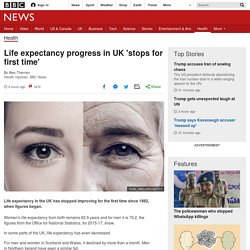
Women's life expectancy from birth remains 82.9 years and for men it is 79.2, the figures from the Office for National Statistics, for 2015-17, show. In some parts of the UK, life expectancy has even decreased. For men and women in Scotland and Wales, it declined by more than a month. Men in Northern Ireland have seen a similar fall. For women in Northern Ireland, and for men and women in England, life expectancy at birth is unchanged. Reductions in childhood mortality have prevented 100m deaths since 1990. Population.io by World Data Lab. Numbers of elderly in 24-hour care set to double by 2035. Image copyright Getty Images The number of people aged 85 and over needing 24-hour care is set to double, says a new study, as an expert warns the care system is "at breaking point".

The study, published in the Lancet Public Health journal, analysed the projected health needs of the elderly in England between 2015 and 2035. It found that the number of 65-year-olds and over needing round-the-clock care is also set to rise by a third. The government says adult social care reforms will be set out in the autumn. Home - Migration Observatory - The Migration Observatory. EU residents will be secure if no Brexit deal says Raab. 7 reasons why we should have open borders. 29 November 2017 Let’s be honest, most people are already in favour of free movement – at least for themselves.
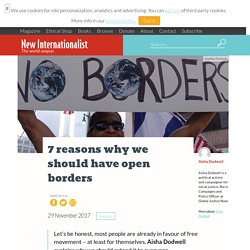
Aisha Dodwell explains why we should extend it to everyone Brexit has left three million EU citizens in Britain in a state of limbo, fearful that their lives could be torn apart by the end of free movement within the European Union. But while the EU has stood firm on free movement within the single market, for those outside the union it has become ‘Fortress Europe’. Europe’s external borders have become the most violent in the world – more people die at Europe’s borders than any other border worldwide. If we care about poverty and justice overseas, we need to start working towards a world of globally open borders for all. At least 2.5 million migrants were smuggled in 2016, first UN global study shows. Three years on the front lines of Europe's migration crisis. Countries around the world, not least the United States, are grappling with what is becoming the norm: an increasing number of people fleeing their homes because of conflict, persecution, poverty or climate change.
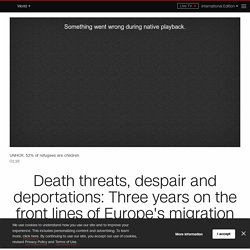
In Europe, almost three years on from what became known as the refugee crisis, tens of thousands are stranded in camps, living hand to mouth on the streets of cities or under the constant threat of deportation. How migrants who send money home have become a global economic force. More people are on the move around the world than ever before.
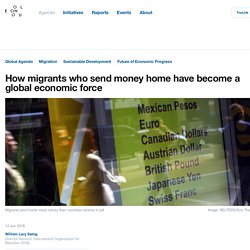
An estimated 258 million people are currently living outside their country of origin. Every migrant chooses to leave home for different reasons, but they all bring their life experiences, knowledge, culture and ambitions with them. As they settle into life in their host countries, they acquire new skills and know-how. And they contribute to their families and communities in their country of origin by sending money home. Financial remittances have been recognized as an important developmental vehicle associated with migration. Top remittance receivers in 2016 Image: IMF and World Bank At the individual and community levels, remittance flows for migrant families can be economic lifelines.
Not all borders make sense. But changing them is dangerous - Off the map. 'The truth is we had to leave': Fleeing Venezuela for Colombia. Cucuta, Colombia - Insecurity, instability and violence have forced more 1.5 million Venezuelans to flee the country since 2014, according to conservative government figures.
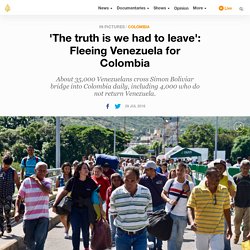
Over half that population have sought refuge in neighbouring Colombia. "Colombia is a lifeline for western Venezuela," said Rafael Velasquez Garcia, the International Rescue Committee's (IRC) head of mission in Colombia. "Every day more than 35,000 Venezuelans cross the Simon Bolivar bridge alone to purchase food and receive vital medical assistance, among other services which are not available in Venezuela. Ahead of World Day against human trafficking, UN expert stresses States’ obligation to stop ‘gross human rights violations’ More than 1,500 people died trying to reach Europe in 2018: UN.